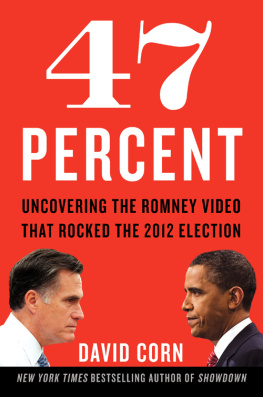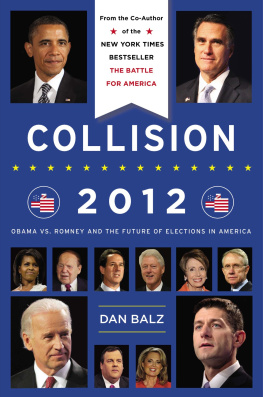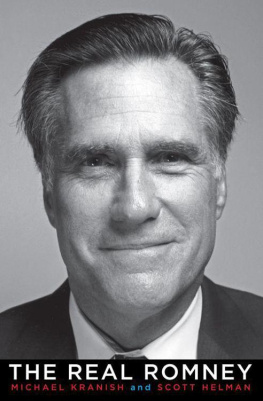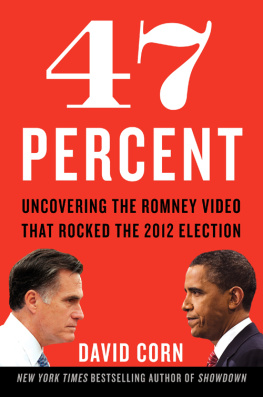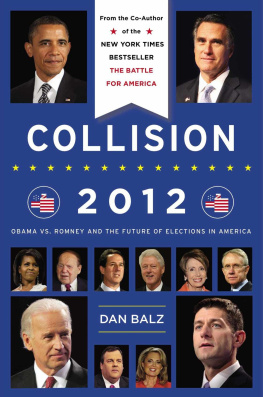A Bad Day on the Romney Campaign
An Insiders Account
Gabriel Schoenfeld
I NTER M IX B OOKS, N EW Y ORK
INTERMIX BOOKS
Published by the Penguin Group
Penguin Group (USA) Inc.
375 Hudson Street, New York, New York 10014, USA
USA | Canada | UK | Ireland | Australia | New Zealand | India | South Africa | China
Penguin Books Ltd., Registered Offices: 80 Strand, London WC2R 0RL, England
For more information about the Penguin Group visit penguin.com.
Penguin is committed to publishing works of quality and integrity. In that spirit, we are proud to offer this book to our readers; however, the story, the experiences, and the words are the authors alone.
A BAD DAY ON THE ROMNEY CAMPAIGN
An InterMix Book / published by arrangement with the author
PUBLISHING HISTORY
InterMix eBook edition / May 2013
Copyright 2013 by Gabriel Schoenfeld.
Cover photo Maria Dryfhout/Shutterstock.
All rights reserved.
No part of this book may be reproduced, scanned, or distributed in any printed or electronic form without permission. Please do not participate in or encourage piracy of copyrighted materials in violation of the authors rights. Purchase only authorized editions.
For information, address: The Berkley Publishing Group,
a division of Penguin Group (USA) Inc.,
375 Hudson Street, New York, New York 10014.
ISBN: 978-0-698-14433-0
INTERMIX
InterMix Books are published by The Berkley Publishing Group
and New American Library, divisions of Penguin Group (USA) Inc.,
375 Hudson Street, New York, New York 10014.
INTERMIX and the IM design are trademarks of Penguin Group (USA) Inc.
For Mimi and Dan
Prologue
No single mistake cost Mitt Romney the presidency. Failing campaigns are something like aircraft disasters. Multiple systems have to give way, typically in a cascade, to bring a modern jet aircraft down. Working as a speechwriter for Governor Romney for nearly two years, I had an intimate view of the cockpit for much of the flight, and an equally intimate view of the systems that failed. Why did Mitt Romney, a man in possession of a formidable intelligence, sterling character, a long record of accomplishments in both business and politics, and Hollywood good looks, fail to unseat a highly vulnerable president?
A code of silence has prevailed in the Romney camp about the shortcomings of the campaign. And it continues to prevail to this day. It exists for reasons of self-protection. It exists to evade responsibility for an outcome that was by no means preordained. So that we can learn vital lessons for the future, I am intent on breaking it.
In the immediate aftermath of defeat, Mitt Romney suggested that President Obama bought the election by means of strategic gift-giving: The Obama campaign, he told a group of his funders during a widely publicized postelection conference call, was following the old playbook of giving a lot of stuff to groups that they hoped they could get to vote for them and be motivated to go out to the polls. In particular, explained Romney, they targeted African-Americans, Hispanics, and young people: In each case they were very generous in what they gave to those groups.
That explanation, of course, is itself an inadvertent clue to one important factor in Romneys defeat. It was an echo of his earlier notorious remarks, covertly videotaped at a fund-raiser, in which he explained that 47 percent of the American people will vote for the president no matter what. There are 47 percent, he continued, who are with him, who are dependent upon government, who believe that they are victims, who believe the government has a responsibility to care for them, who believe that they are entitled to health care, to food, to housing, to you-name-it.... My job is not to worry about those people. Ill never convince them they should take personal responsibility and care for their lives. It was these comments and the uproar they ignited that might have sounded the death knell for Romneys candidacy. Without question, the Republican candidate made some serious mistakes. But it was not pilot error alone that brought down the craft.
Republican operatives in and around the Romney campaign have pointed to a variety of other explanations for their candidates defeat, ranging from the Obama campaigns unanticipated success in mobilizing minority voters to the sheer bad luck of two hurricanes, the first knocking Romney off stride at a crucial moment (the Republican convention) and the second casting a favorable spotlight on Barack Obama at an even more crucial moment (the final week of the campaign).
Those were certainly contributing factors, as was the financial and political damage done to the Romney campaign from the protracted Republican primary contest with its parade of debates. Yet like Mitt Romneys flaws, they are far from the whole story. Every presidential candidate in our history has been flawed, each in his own way. A well-functioning campaign finds ways to overcome those flaws and to protect the candidate from himself.
But a curious aspect of the story here is that a man celebrated for his management prowess delegated an immense amount of decision-making power to individuals who failed to carry out successfully that and other basic functions. Though I continue to feel affection for Mitt Romney and his wife, Ann, and though I treasure the friendships I developed with many of the talented people who worked on Romneys staff, I have decided to subordinate discretion and friendshipundoubtedly, in some cases, to sacrifice friendshipto provide an account of what happened that is as accurate and incisive as I can make it.
The stakes for gaining a full understanding of what went wrong are high. For all of us as citizens, at issue is nothing less than our obligation to comprehend the meaning of our own past and what it portends for the future. The mechanics of elections and campaigns are today the focus of intense public scrutiny, with issues of money, access, and influence the subject of controversy and the object of a growing body of regulations and laws. Large questions loom about the quality (and sometimes the lack thereof) of the men and women who rise to the fore and choose to become presidential candidates. The more we know about how things worked in this last cycle, the better off we all will be as we seek to perfect our highly imperfect electoral institutions.
For the Republican Party the stakes are nothing less than avoiding yet another defeat in 2016. The party has lost the popular vote in five out of the last six presidential elections. The Republican National Committee (RNC) has been laboring to understand what has gone wrong. Indeed, it has published a 100-page autopsy of the Romney campaign under the positive-sounding title of the Growth & Opportunity Project. Based on interviews with 2,600 Republicans of varying ideological stripes, the study examines problems with messaging, fund-raising, coalition-building, and sundry other aspects of the campaign. It concludes that the party has been increasingly marginalizing itself and that the time has arrived for it to smartly change course.





